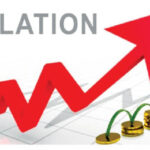The prices of commodities in Nigeria have been on an upward trajectory for more than 10 straight months, according to data from the National Bureau of Statistics (NBS).
The bureau blamed the trend on a number of factors including the recent border closure, hike in transportation cost and exchange rate fluctuation in the country.
The sharp drop in foreign reserves as a result of falling oil prices in the international market has also seen speculators feeding fat on the exchange rate corridor.
The current exchange rate at the Bureau De Change (BDC) operators in Abuja and Lagos is N475/$1.
Rise in inflation
Latest report from the NBS showed that the inflation rate rose to 12.56 per cent in June, up from 12.40 per cent recorded in May 2020.
The latest Consumer Price Index (CPI) also shows that food inflation is even higher than the overall inflation rate.
It rose to 15.18 per cent in June compared to 15.04 per cent in May 2020.
NBS attributed the rise in the food index to increases in prices of bread and cereals, oils and fat, meat, fish, vegetables, fruits, potato, yam and other tubers.
Daily Trust checks across the country show that there is an increase in the prices of foodstuffs and other agro commodities.
While the hike in agro inputs like herbicides and pesticides was partly attributed to forex, since some of them are imported, those of foodstuffs were in addition to the activities of middlemen, who hoarded the produce during the last harvest and are now selling at exorbitant prices.
At the popular Dawanau market in Kano, a 50kg bag of local rice is sold at N27,000, while the foreign variety is sold for N32,000.
A 100kg bag of beans is sold at N22,000, while the same size bag of maize is sold at N18,000 as against the old price of N14,000 and N11,000 respectively.
Wheat is now sold for N32,000 per 100kg in the market as against N24,000 previously sold.
A 25kg gallon of groundnut oil now sells for N13,000 while a 10kg bag of Semovita goes for about N3,000 as against N2,700 previously sold.
In Abuja, a 50kg bag of foreign rice now goes for N32,000 in some markets while a 100kg bag of beans now costs N25,000 as against N15,000 previously sold and a 25kg gallon of groundnut oil is now sold at around N16,000 as against N12,000.
It was also learnt that farmers are battling with the high cost of herbicides and pesticides caused by foreign exchange.
Daily Trust reports that some agro inputs that were previously sold at between N1,200 and N2,500 per litre, now cost N4,000 and N5,000 per litre.
The NBS, in its COVID-19 impact survey on a nationally diverse sample of 1,950 households between April and May, noted that during the lockdown, the overall food prices rose sharply in April (+1.2% M-o-M) and May (+1.4% M-o-M) from (+0.9% M-o-M) in March.
NLC groans over high goods, services prices
The Nigeria Labour Congress (NLC) has expressed concern over the increase in the prices of goods and services in the country.
NLC president, Comrade Ayuba Wabba, who spoke to Daily Trust on telephone, said the issue of inflation, high cost of goods and services and more importantly the continued devaluation of the Naira against major currencies have made things difficult for Nigerian workers.
“Each time you increase the cost of petroleum products, transportation will go up, cost of food will go up because there will be a value chain reaction.
“It will reach a time when our people will revolt, many countries around the world revolted because of the increase in prices of commodities. Nigerians are very patient people but we shouldn’t allow people to be pushed to the wall.”
CBN begins rates unification
In June, Governor of the Central Bank of Nigeria (CBN), Godwin Emefiele, told investors that the CBN would unify the exchange rate around the Nigerian Autonomous Foreign Exchange Rate (NAFEX) in line with the conditions of the World Bank.
Information on the website of CBN last weekend showed an adjustment of the official exchange rate to N380/$1 from N360.1/$1 – as of Thursday, August 6, 2020.
The Director, Corporate Communications at CBN, Mr. Isaac Okorafor, was yet to respond to our telephone enquiries and message which he promised to do, on what Nigerians should expect from the apex bank on the forex adjustment moves.
Experts differ on forex hiccups, adjustment
An expert in trade policy and negotiations, Victor Liman, said foreign exchange fluctuations were bad for investment attraction as investors would not be able to forecast returns on their investments.
Liman, who is Nigeria’s Chief Trade Negotiator, told Daily Trust that a diversified exchange rate regime creates an unpredictable environment.
The Naira exchanged 475 for a dollar at the black market on August 11, 2020, while CBN’s official exchange rate is N380 per dollar.
“If I put in $100m into Nigeria, would I be able to take back $100 million if I want to do so? You can’t guarantee that because it is unpredictable,” Liman said.
The acting Director General of the Manufacturers Association of Nigeria (MAN), Mr. Ambrose Oruche, noted that most manufacturers depend on imported raw materials and machinery to produce, adding that even the gas they use is priced in dollars.
“When the cost of production goes up, the producers will just bear a little of it and pass the remaining to the consumers,” he said.
The MAN boss urged the government to resuscitate the Export Expansion Grant (EEG) scheme to encourage export tax and derive revenue to help exporters expand their international businesses.
Prof. Uche Uwaleke, a fellow of the Chartered Institute of Bankers of Nigeria (CIBN) said the recent upward adjustment of the exchange rate by CBN was in response to conditions for drawing down on the IMF Rapid Financing Instrument (RFI) facility.
However, he said, “It is at variance with the Medium Term Expenditure Framework and by implication the 2020 budget which was based on an official exchange rate of N360 to the dollar.”
In the short term, Uwaleke said the devaluation would likely hurt the economy and bring some pains to most Nigerians as the country is import-dependent and relies on oil revenue.
From the various sectors of the economy, more experts shared their views on the forex adjustment moves.
The Executive Secretary, Association of Power Generation Companies (APGC), Dr. Joy Ogaji, said the unification of forex may have a huge impact on bringing down the funds expended on power generation inputs especially gas.
“We have been bearing the forex loss from inception till now. With the current change, we believe the burden is more on the concessionaires who pay their fees in dollars to the government,” she stated.
Chairman of Mainstream Energy Solution Limited (MESL), operator of Kainji and Jebba hydropower plants in Niger State, Col. Sani Bello, said harmonising the dollar would help its firm as it pays concession fees to the federal government in dollars, and would always have to source forex at the black market.
“I therefore urge government and government agencies to look at our case much more favourably and come to terms by pegging the naira at a certain value with the US dollar,” he urged.
President of the Nigerian Consumers Protection Network (NCPN), Barrister Kunle Olubiyo, said there is the challenge of enforcing the forex unification at the BDCs.
“The manufacturers and organised private sector rarely have access to the official exchange rate window. The implications are unambiguously clear,” Olubiyo noted.
He added that the development will further widen the market shortfalls and may be counterproductive in the immediate, medium and long term, unless the government enforces it at the parallel market to forestall unstable and arbitrary hike of forex by the BDC operators.
Ex-CBN gov speaks
Meanwhile, a former Emir of Kano and former CBN governor, Muhammad Sanusi II, was recently quoted in some section of the media to have said: “There are lots of shocks the Central Bank has no control over.
“It would be a brave governor of the Central Bank who would announce a target rate when he does not know how much is going to come in or what is going to happen to the oil price tomorrow or the day after, and the entire world is going through shocks.
“I think it is extremely important that we recognise that the only clarity that the Central Bank can give at the moment is to say we do plan to converge, and that means the official rate is going to be devalued, but we are not going to do it in a rapid and disorderly manner.”
Harmonising forex to clear lapses – ABCON
Speaking on the correlation of exchange rate fluctuation and prices of food items, the National President of the Association of Bureau de change of Nigeria (ABCON), Aminu Gwadabe said, “We all access the same market. We are dealing with manufacturers who use raw materials with foreign components; we practically import fuel and food items. The local alternatives are not sufficient as we speak.’’
He said the BDCs were hopeful that the unification of forex rates by CBN would remove imperfections.
“The unification will remove a lot of imperfections. It is the condition precedent upon draw down of all the loans Nigeria is seeking from the IMF and the World Bank. Also, the multiplicity of exchange rate is encouraging illegal behaviour like rent seeking and resource allocation,’’ he said.

 Join Daily Trust WhatsApp Community For Quick Access To News and Happenings Around You.
Join Daily Trust WhatsApp Community For Quick Access To News and Happenings Around You.


